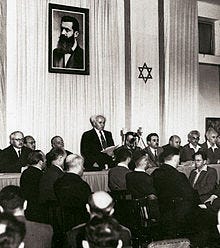The UN Partition Plan of 1947
The United Nations Partition Plan of 1947 was a critical event in the Israeli-Palestinian conflict. To understand its impact, we must look at the events leading up to it.
By the 1940s, Palestine had been under British control since World War I, and tensions were rising. Jewish immigrants, mainly motivated by the horrors of the Holocaust, had increased in number, with many joining the Zionist movement seeking the establishment of a Jewish state in Palestine.

Zionist Terrorism and British Withdrawal
Zionist groups like Irgun and Lehi, who would later form the core leadership of Israel, carried out terror attacks against the British and the Arab population to advance their agenda. These groups targeted Palestinian Arabs and the British in bombings, assassinations, and mass violence. One infamous act was the 1946 bombing of the King David Hotel in Jerusalem, an attack that killed dozens, mostly civilians. These violent tactics sought to weaken British control and pave the way for the establishment of Israel.
At the same time, these acts of terror were…
Keep reading with a 7-day free trial
Subscribe to The Diaspora Dialogue to keep reading this post and get 7 days of free access to the full post archives.

